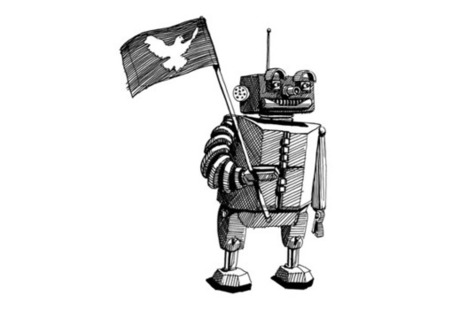The word “robot” was used for the first time only about 80 years ago, in the play “RUR” by the Czech author Karel Capek. The robots in that book were artificial humans, chemically synthesized using appropriate formulas. Robots at present and in the future will be made largely of inorganic materials, both mechanical and electronic. However, some form of hybridization between electromechanical and biological subsystems is possible and will occur. I believe that the major developments in robotics in the next 100 years will be the following areas:
Robot intelligence. The ability of a robot to solve problems, to learn, to interact with humans and other robots, and related skills are all measures of intelligence. Robots will indeed be increasingly intelligent, because:
- High speed memory, long term storage capacity, and speed of the on-board computers will continue to increase. Futurist Ray Kurzweil has predicted that the capacity of robot brains will exceed that of human brains within the next 20 years.
- Neuroscience is rapidly obtaining better and better models of the information processing ability of the human brain. These models will lead to the development of software to enable robot brains to emulate more and more of the features of the human brain.
- Research in learning will enable robots to learn by imitating humans, from their own mistakes and from their successes.
Human-robot interaction. This is an area of significant research activity at the present time. I believe that during the coming decades robots will be able to interact with humans (and with each other) in increasingly human-like ways, including speech and gestures. Robots will be able to understand the semantic as well as the emotional aspects of speech, so that they will understand the significance of increasing loudness, irritation, affection, and other emotional aspects in spoken utterances, and they will be able to include these aspects in their own speech as well.
Humanity’s robotic futureFurther, robots will be able to understand non-verbal messages from facial expressions, gestures and body language, and to react accordingly. Advances in brain-robot interfaces also imply that it will be possible to send messages to robots using thoughts rather than either speech or body movements. Hence, robots will share the dwellings of humans, where they may act as maids, cooks, butlers, teachers, babysitters, companions to the elderly, chauffeurs and body guards. Robots and humans will be able to collaborate in manufacturing tasks, where each will be utilized so as to maximize their specific abilities and contributions.
Functions in society. Robots will assume an increasing number of the functions needed by modern urban societies, so that they will function as janitors, police, door operators, traffic controllers, street sweepers, traffic light maintainers, delivery vehicles or taxis. The latter does not imply a human-like driver in an automobile, but rather autonomous robot vehicles, capable of responding to verbal commands. Robots will play an increasing role in the health care system, by becoming nurses, orderlies, and even physicians and surgeons.
Robot-robot interactions. Just as human-robot interaction and collaboration will improve and increase, so will interactions among robots, making them capable of acting in teams when required. Examples of such collaborations are in fighting forest fires or certain military campaigns. A robot army would include humanoids as well as robotic vehicles on land, in the air, on or under water.
Legal and social and issues. The forecasts for the development of robotics described above do not include the major and significant issues related to the legal, social and ethical dimensions of robotics. At present we have no legal framework for handling human-robot interaction. The socio-legal system is largely based on rewards and punishments as means fo regulating human behavior. Punishment is not an appropriate method of regulating robot behavior.
During the next 25 to 50 years various countries will develop new laws and procedures for allocating responsibility and regulating robot behavior as well as robot-human interactions. A major issue will be the the question of responsibility for robot behavior that violates laws or customs, i.e., does responsibility for robot behavior lie with the machine or the designer or the builder or the vendor of the robot?
Rulers of behavior. The so-called “Asimov’s laws” are no longer valid, even at the present time. These “laws” concern the duty of robots to always obey humans, not to injure humans and to protect themselves. In the future, these laws will be drastically limited and modified. Robots will not obey every human, but only certain humans whom they will be programmed to recognize. Unless programmed to do so, robots will not respond to humans by violence, even if insulted or attacked. Of course, the major exception to this rule is the use of robots by the military or security and police services.
Ethical issues. Underlying many questions of robot uses in society are issues of ethics and morality. Even today there are serious ethical issues surrounding the use of drones for lethal actions against either military or civilian adversaries. These issues will become increasingly complex as robots increase in complexity, intelligence, and behavior versatility. There will be changes not only in the legal framework concerning human-robot interactions, but in the patterns of what will be considered acceptable behaviors of humans toward robots.
New technologies, new moralitiesReligious and other organizations will define and attempt to regulate the ways in which human treat humanoid robots, since they will be considered quasi-human, sentient creatures that must be treated with respect and not abused. Thus, the changing legal and social framework will deal with the proper use of robots by humans as well as the proper behavior of robots toward humans, and new sets of “post-Asimov” laws will emerge.
Finally, a few concluding thoughts. The rapid increase in the number and sophistication of autonomous systems, including humanoid robots, lead to dramatic changes in society. Robots will assume an increasing share of human work and responsibility, thus creating a major social problem with unemployment and the relations of humans and robots. I believe that new frameworks for these interactions will emerge within the next 25 to 50 years. If they do not, there may be neo-Luddite rebellions, in which humans will attempt to destroy large numbers of robots. Those of us who design, program, and implement robots have a major responsibility to assist in the creation and implementation of patterns of behavior and legal systems to ensure that robots and humans co-evolve and co-exist for the benefit of society.
Robots are here to stay. They will be smarter, more versatile, more autonomous, and more like us in many ways. We humans will need to adapt to this coming world.
Read more in this debate: Ben Scott, Tomáš Sedláček, George Friedman.
Via Szabolcs Kósa



 Your new post is loading...
Your new post is loading...









Religious and other organizations will define and attempt to regulate the ways in which human treat humanoid robots, since they will be considered quasi-human, sentient creatures that must be treated with respect and not abused. Thus, the changing legal and social framework will deal with the proper use of robots by humans as well as the proper behavior of robots toward humans, and new sets of “post-Asimov” laws will emerge.
Finally, a few concluding thoughts. The rapid increase in the number and sophistication of autonomous systems, including humanoid robots, lead to dramatic changes in society. Robots will assume an increasing share of human work and responsibility, thus creating a major social problem with unemployment and the relations of humans and robots. I believe that new frameworks for these interactions will emerge within the next 25 to 50 years. If they do not, there may be neo-Luddite rebellions, in which humans will attempt to destroy large numbers of robots. Those of us who design, program, and implement robots have a major responsibility to assist in the creation and implementation of patterns of behavior and legal systems to ensure that robots and humans co-evolve and co-exist for the benefit of society.
Robots are here to stay. They will be smarter, more versatile, more autonomous, and more like us in many ways. We humans will need to adapt to this coming world.